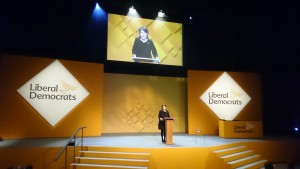Adam Brookes
Liberal Democrat Town Councillor for Market Deeping Learn more
Sex, drugs, and rock fracturing – Lib Dems meet in York
by Adam Brookes on 14 March, 2016

Catherine Bearder MEP speaking at Lib Dem Spring Conference in York
I’ve just returned home from the Lib Dem’s Spring Conference which has taken place this weekend in York. I enjoyed meeting friends, making new ones, listening to topical fringe sessions, and getting involved with the process of deciding our party’s policy.
This was the first conference to be conducted under new one member, one vote rules which give all members attending conference the right to vote on changes to our policies. Previously members were required to be selected by their local party to be a conference representative in order to vote. This is a very welcome move to improve the ability of members to get involved in setting party policy. However, we should continue to look at ways in which we can open this up to members who cannot attend conference.
A highlight of conference was the #LibDemPint event where speakers included former Deputy Prime Minister and former Lib Dem leader Nick Clegg MP, former MP Simon Hughes, and, looking to the future, several strong potential candidates to become Lib Dem MPs. It was particularly interesting to hear from Jim Williams and the work he’s doing through the Your Liberal Britain project to establish a vision of a truly liberal and social democracy in Britain and so help to answer how that can be best achieved.
This was my first opportunity to hear Tim Farron making a speech to conference. I missed his Autumn conference speech due to leaving early to ensure I made the start of a Town Council meeting. Tim’s speech was well received and his strong criticism of the Government’s inadequate response to the refugee crisis in Europe received several standing ovations. Here’s his speech in full.
The most difficult debate for the party was on Sunday morning on improving diversity of our MPs. There have been several attempts to address the “too male and too pale” issue over the years, including a previous attempt to introduce all-women shortlists. Instead the focus has been on providing training and support to candidates from under-represented groups. This has not addressed the problem however, with some women describing the training as patronising and in some cases has had the opposite effect to that desired.
A move to allow for all-women and all-disabled shortlists was therefore proposed, some of which is limited to the next General Election in 2020. I was pleased to see that this passed, noting the shift in opinions of several who previously opposed now supporting given the failure of other attempts.
The fracking debate was one disappointing moment for me during conference. I was supporting the position of the Association of Lib Dem Engineers and Scientists, feeling uneasy about an outright ban on fracking which the evidence doesn’t necessarily seem to justify, with a review by the Royal Society and the Royal Academy of Engineering finding that the associated risks can be effectively managed, for example.
The move to support the legalisation of cannabis was another big step taken by the party. This follows the work of a panel of experts to develop a framework for a regulated cannabis market, which seems in contrast to the approach on fracking. It’s clear that the war on drugs, or as it was described by one speaker in the debate more accurately, a war on drug victims, has failed, is counterproductive, and it’s time for a new approach.
Overall, it was a great conference, my favourite of the three I’ve attended so far, and I left with a great sense of optimism for the future of our party.
Why not join the party yourself and get involved?
Leave a comment
Leave a Reply